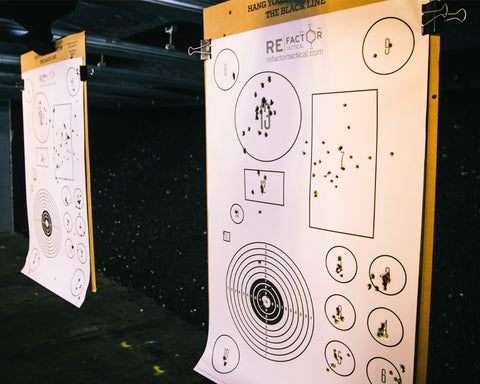With new cases of the Corona Virus popping up in the United States, it’s important to start looking at what things you need to properly prepare yourself for a potential national outbreak of the virus. This blog is not designed to serve as a fear-mongering piece that will push you into panic mode, but more of a general guide of what things you can do to prepare yourself for the worst.

The Most Likely Course of Action for The Corona Virus in the United States
While the Corona Virus is a deadly virus, it’s not nearly as deadly as past rapidly spreading diseases such as SARS, Swine Flu and Ebola. However, the virus is highly contagious which means there’s a strong chance you or someone you know may become infected. With around a 2% mortality rate and around 3,000 reported deaths globally (at the time of this article), the Corona Virus has a long way to go before it starts making a profound effect on the general global population. In contrast, the Corona Virus is a far less deadly virus than the common flu (as far as annual deaths).
“Until recently, the World Health Organization (WHO) estimated the annual mortality burden of influenza to be 250 000 to 500 000 all-cause deaths globally; however, a 2017 study indicated a substantially higher mortality burden, at 290 000-650 000 influenza-associated deaths from respiratory causes alone, and a 2019 study estimated 99 000-200 000 deaths from lower respiratory tract infections directly caused by influenza.” ~ National Library of Medicine
This is basically a long-winded way of saying that you are not likely to die from contracting the Corona Virus. Instead, what we should be worrying about is how the population and government will react to the spread of the virus and what we can do to prepare.
Stages of a Spread in The United States
When the virus hits the United States there will be several phases of the spread and how the government and the local population will react. We have already seen some of these phases start to come into play.
Local Cases and Widespread Rumor mill:
We are currently in the first stage of the spread with a lot of skepticism on how bad the infection might hit the United States. In this stage, it’s pretty much business as usual with a lot of talk and amounting fear. We have already seen this stage starting to affect both global and US markets with a sharp decline in the stock market. However, the flow of goods and resources is not restricted and we can still get most of the daily items we use. THIS IS THE MOST IMPORTANT STAGE TO BEGIN PREPARING! This is the most important stage to begin preparing because all of the goods you might need to survive the follow on stages are readily available and still inexpensive.
Localized Outbreaks:
We are now seeing the first individual cases of the virus in the United States and the possibility of some small, localized outbreaks. This will lead to some amounting fear as people start to realize this is now a very real and present threat. In this stage, we will start to see people becoming increasingly worried and start to take the initial steps to prepare themselves for the potential outbreak. We will also start to see governments taking action to isolate the localized outbreaks and begin to prepare hospitals, schools, places of large gathering and political offices for the pending large scale outbreak. If the government can localize the outbreak here there is a small chance we will see much of national scale effect from the spread of the disease and we will be back to normal in a month or so.
Wide Spread Outbreaks:
Here we see thousands to the tens or even hundreds of thousands of affected patients. In this stage we will see cities completely quarantined, schools shut down and hospitals overrun. There will be a shortage of medical supplies, food supplies, gas, and other daily use items. If you are waiting for this stage to hit before starting to prepare yourself, it will be too late. In this stage grocery stores will be wiped out and the price of goods will be inflated. People will fight over the last supplies and getting basic needs items will be difficult at best. We will potentially see looting and an increase of violence as people begin to panic.
National Quarantine:
After a widespread outbreak, we will see people begin to avoid each other at all costs and extreme isolation. This means the citizens who run the power plant will stay home, the truck drivers who transport goods will stop their deliveries and the grocery stores will be completely empty. Don’t worry, this is a temporary phase, but it will have pretty profound effects. This is the stage that you are preparing for. This is the stage that will cause a massive economic collapse as well as cause damage that we will feel for years to come.
Recovery:
As the virus subsides people will begin to return to business as usual. Government facilities will go back into business, stores will restock their shelves, people will recover from the virus and we will start going back to a place of normalcy. Unfortunately, there will likely be a large number of people out of jobs as businesses have to shut their doors after not making money for a few months on end. This is where a good financial preparation will take place.
How To Prepare Yourself
Food:
Food is crucial in this scenario. We recommend starting by going to your local grocery store and stocking up on both perishable and non-perishable food items. You don’t need to buy the garbage stuff, get yourself some good healthy meals and enough to last you and your family at least a month or two. Canned soups, noodles, vegetables, peanut butter, and cereals are all great items to stock-up on. If you buy things you eat on a regular basis you can always eat it later if the outbreak doesn’t hit a massive scale. We recommend only buying a few items to freeze or refrigerate since there is the potential for a loss of power if power plant employees are prohibited from going to work to avoid infection. You should attempt to buy food that offers a high amount of calories and energy and avoid candy or sugar. If you want the easy button you can always get freeze-dried food off Amazon that will be delivered in a few days.
Gas:
Since this is a global outbreak there is the chance that the countries we often receive gas from will experience a massive outbreak that will dramatically reduce the delivery of gasoline as well as hyperinflation of oil prices. Starting now, do not let your car get below a half tank of gas. We also recommend getting a few large gas cans and stock up on gas in the event there is an extreme shortage.
Water:
Water is one of the most crucial items we rely on and without it neither you or your family will survive. Luckily, you will most likely still be able to drink your local tap water. However, it’s very wise to stock up on enough water to last you an entire month. If you’re wondering how much water you might need per day it’s around 3.7 liters per person. Your best bet is to go to the grocery store and purchase a few 5-gallon jugs of water. However, it’s also not a bad idea to purchase either shelf-stable canned water or iodine tablets as a backup. Keep in mind that we drink 3.7 liters and that doesn’t include water needed for things like showers, meal preparation or for your pets.
Pet Food:
Pet food is one of those things you don’t think about until it’s too late. You will benefit from going to the local pet store and purchasing a few bags of kibble for your pets to use. You should attempt to get the same kind they use now so you can again use it later on in the event there is only a mild epidemic.
Health Supplies:
The Corona Virus acts in the same manner as the common flu with some severe cases of fever and respiratory infections. It’s wise to stock up on items to combat these in the event you can’t get to the hospital or supplies run out. These include things like tissues, Nyquil, Dayquil, Advil (fever reduction), Mucinex and nasal sprays.
Protective Equipment:
Now is definitely the time to stock up on protective equipment since the CDC has already reported a shortage. Protecting yourself from others is the best way to avoid infection, especially if you have to go into public. The CDC has made it clear that surgical masks alone will not prevent you from contracting the virus and that it does not offer any protection from breathing in the virus but only acts as a protective barrier against fluids. In addition, even if you pick up a proper mask that can filter out the virus, it’s still easy to contract the virus through your eyes. The only real thing that will protect against the virus is an actual properly fitted gas mask, gloves, and a very strict washing regimen. This means that stocking up on some cheap masks is kind of a waste and won’t do much to actually protect you. If you want to really be safe you will need to go all out, but we also recognize that’s a bit extreme. Further, the Surgeon General asked individuals to stop purchasing safety masks since they are already predicting a shortage for medical professionals.
Medication:
If you have commonly used medication such as insulin, you should stock up to prepare for a potential shortage. Get enough medication to last you at least 2-3 months. It’s wise to also stock up on common medications such as aspirin, allergy pills, Neosporin, first aid items, diarrhea medication, and other daily use items.
Money:
It would be wise to pull out cash in the event the banks shut down. Even if the banks remain open, the individuals who stock ATM machines may remain indoors to avoid infection leaving a shortage of cast. The amount you pull out is entirely dependent on you but should be enough to purchase any needed items.
Flashlights, candles, and Batteries:
Again, if the power system experiences an outage you will be reliant on what you have at home to see in the dark. Don’t skimp here since most people purchase cheap flashlights and regret it later. This is one of those items you should always have anyways. Ensure you get enough for your home, office, and vehicle.
Gas Stove:
If there is a disruption in natural gas there may be a need for natural gas and a gas stove to cook your meals. The best way to achieve this is by getting some tanks of propane as well as a gas stove. You can certainly get by with a camp stove but there’s no point in roughing it if you don’t need to.
It’s important to note this isn’t a definitive guide and it’s really easy to go down a rabbit hole here. While there is a chance we could see a large-scale outbreak, it’s also entirely possible this will be nothing at all and there will only by a minor disruption overall. Ensure you take the time to educate yourself on the virus and its spread to keep yourself as prepared as possible!






Leave a Reply
Your email address will not be published. Required fields are marked *